Tips and Articles
Mudslingers get dirty
Updated: 2011-06-09 15:58
By Yang Wanli (China Daily)
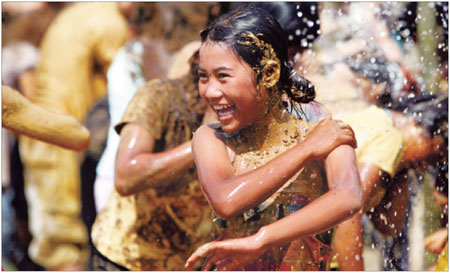 |
|
Locals and tourists flock to the county square in Cangyuan, Yunnan province, to enjoy some fun with mud in Va's celebration of Monihei. [Photo/China Daily] |
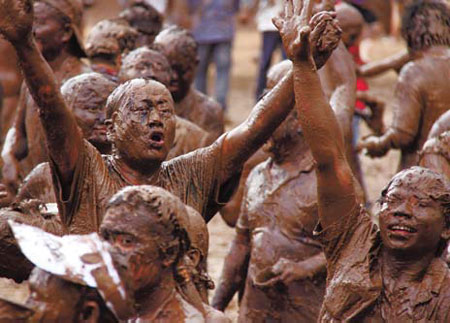 |
|
Participants of the festival look like chocolate sculptures that have come to life as the smearing approaches its crescendo. [Photo/China Daily] |
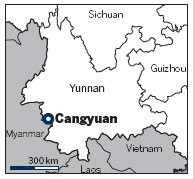
Slathering one another with fistfuls of muck is the mainstay of the Va ethnic group's Monihei Festival in Yunnan province. Yang Wanli reports.
The instant the head of Cangyuan Va autonomous county shouted "Monihei!", the crowds bolted toward 60 barrels set in the county square, clawed out fistfuls of black slime and started smearing one another. At first, it was only the men and boys who were plastering one another with the ��mud�� - actually a concoction of chocolate and herbs from Myanmar - in this remote settlement in Yunnan province. But before long, girls and women joined the action.
Soon, everyone was lathering each other's faces and bodies with sludge. Their giggling was punctuated by the occasional eruption of cheers.
Tens of thousands of people descended on the county on Yunnan's border with Myanmar for the festival in early May.
Monihei, which literally translates as "Smear You Black", is one of the largest Va celebrations.
Anyone can participate, as long as they follow the cardinal rule, a middle-aged local woman tells me.
"You can smear anyone you like, but you can't get angry, no matter how much you get smeared," she explains. "Actually, the more you get smeared, the more good fortune you will receive."
Following the locals' suggestions, I donned clothes and shoes that could be thrown away and plugged my ears with cotton balls - a necessary measure I discovered - and joined the ruckus.
I knew muckraking journalism was dirty work but had never imagined it in this context.
It was the Va - known for their openness, vitality and hospitality - who launched most of the slimy salvos in what is colloquially called the "mud war". Clad in bikini-like dresses, the Va women chased the young men and coated them with mud.
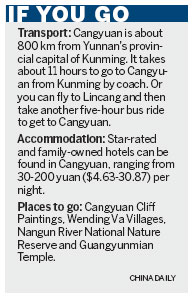
Once in the fray, I realized participants purposefully smear one another's faces first to create a mucky mask that provides anonymity, hence reducing revelers' inhibitions.
The festival originated from an ancient Va tradition, county head Xu Xiangdong explains.
In ancient times, they would smear a mix of stove ash, ox blood and mud on one another's faces to scare off evil spirits.
The Va venerate the color black, which they associate with diligence and health, and used to dye their teeth with ink. Consequently, the festival participants who end up the blackest are admired as the most beautiful.
Celebrations of the festival have since expanded to other ethnic groups around Cangyuan.
The Va believe the herb used to make the muck, niangbuluo, can resuscitate the dying. Modern medicine has found it can treat heat stroke. And it is said to yield cosmetic benefits, too.
As the smearing approached its zenith, participants looked like chocolate sculptures that had come to life.
The musical chanting of "Monihei" grew louder. Young men started hoisting the barrels above their heads and chasing their crushes.
Sludge-covered figures started dancing near the front of the square, occasionally slipping and tumbling to the ground, only to hop back to their feet and re-engage in combat.
The ooze on my face was starting to dry into a thick crust, and I could hardly blink, let alone see.
About an hour after it started, the celebration was doused by a sudden rainfall.
The shower washed the mud off me, and after about 10 minutes, I could clearly see the world again.
I saw that even the police officers' uniforms were finger-painted with sable-colored handprints.
After half an hour, the sun usurped the rain clouds' rule of the sky.
I sat at the edge of the square, enjoying a moment of calm after the rampage when two black gobs rolled out of my ears and plopped on the ground - the cotton balls.
I realized I'd made the right decision to put them in.
Li Yingqing and Guo Anfei contributed to the story.
E-paper

Pearl on the Yangtze
Wuxi is considered a town of natural beauty and its motto is "city of water and warmth".
Prose and consternation
Riding on a mystery train
Way of a warrior
Specials

Wealth of difference
Rich coastal areas offer contrasting ways of dealing with country's development

Seal of approval
The dying tradition of seal engraving has now become a UNIVERSITY major
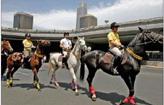
Making perfect horse sense
Riding horses to work may be the clean, green answer to frustrated car owners in traffic-trapped cities
